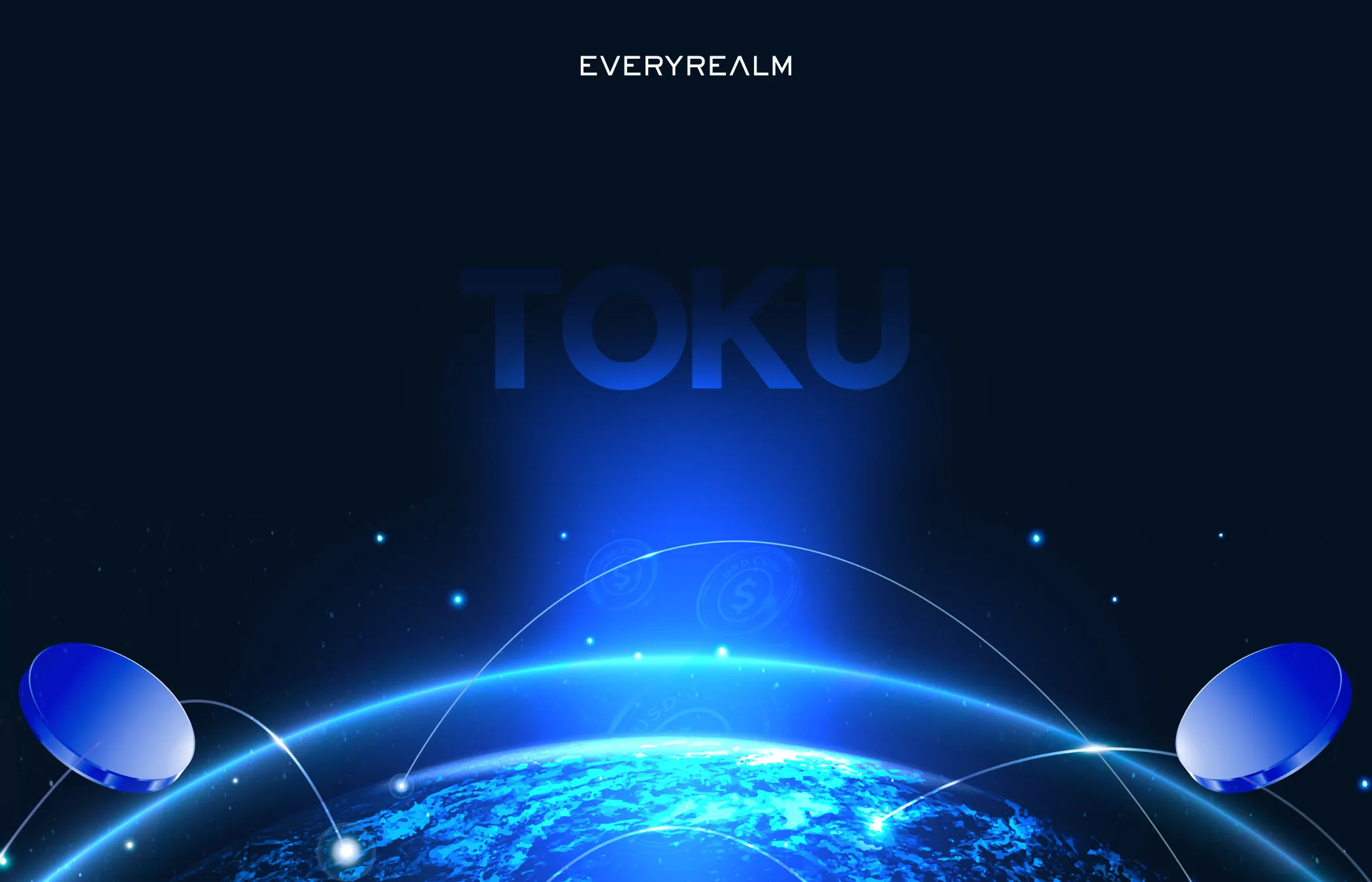
5 Big Cost Savings from Switching to Stablecoin Payroll for Global Teams
Discover how stablecoin payroll slashes global payment costs, reduces fees, and streamlines compliance for international teams.

.avif)
If you’ve ever tried to pay a global team through traditional banking rails, you already know the pain:
- Surprise FX fees.
- 3–7 day wire delays.
- Hours of manual compliance work just to stay legal in each jurisdiction.
Now multiply that across 10 countries and 50 contributors, and it’s not just inefficient - it’s expensive, messy, and hard to scale.
That’s where stablecoin payroll comes in.
Instead of routing funds through a maze of banks, intermediaries, and currency exchanges, platforms like Toku let you pay employees and contractors directly using fully compliant USDC rails. No more waiting on wire cutoffs. No more reconciling fees across 10 currencies. No more wondering if payments actually arrived.
And the kicker?
It’s not just faster - it’s cheaper.
In some cases, switching to stablecoin payroll can cut your global compensation costs by up to 70%, while giving your finance team real-time visibility, automated tax compliance, and peace of mind across jurisdictions.
This article breaks down the 5 biggest ways stablecoin payroll delivers real savings - from cutting wire fees and FX losses to slashing compliance overhead and improving cash flow.
If you’re a CFO, DAO treasurer, or HR lead managing international talent, here’s exactly where the ROI lives - and how to unlock it.
The Hidden Costs of Traditional International Payroll
At first glance, it might seem like international payroll just means “paying people in other countries.” But behind the scenes, it’s a tangle of fees, delays, and admin overhead that’s costing companies far more than they realize.
Let’s break it down.
1. Banking & Transaction Fees
- International wires can cost $30–$100 per transaction, depending on the bank and corridor.
- Services like SWIFT or intermediary banks tack on invisible routing fees, especially for emerging markets.
- Paying 50 team members in 10 countries? That’s easily $2,500–$5,000/month in transfer costs alone.
2. Foreign Exchange (FX) Losses
- Converting USD to local currencies often includes 3–6% in hidden markups.
- Rates are rarely transparent, and timing mismatches can lead to unexpected budgeting shortfalls.
3. Delays and Float
- Bank wires take 3–7 days to settle, especially across borders.
- You’re often paying in advance to ensure workers receive funds “on time,” which ties up working capital.
4. Compliance and Classification Risks
- Every country has different rules for payroll, taxes, and employee classification.
- Missteps can mean fines, back taxes, or legal exposure - especially if you're using contractors without proper oversight.
5. Manual Admin Overhead
- You’re coordinating across HR, finance, legal, and local tax advisors.
- That means dozens of hours per month just to ensure payroll doesn’t break.
Bottom line: Traditional payroll systems weren’t built for globally distributed teams - and they’re eating into your margins more than you think.
Cost Saving #1 - Eliminating Cross-Border Transaction Fees
Traditional international payroll systems are riddled with fees at nearly every stage:
*Network fees depend on the blockchain (Ethereum, Solana, Polygon) - and can often be batched or optimized for high-volume payouts.
For startups and DAOs with global contributors, this adds up quickly.
Real-World Example:
Imagine you’re paying 50 contributors in 10 countries monthly. Using traditional wires at $30 each = $1,500/month in fees.
Even a “cheaper” platform like PayPal might take 3–5% per payout, depending on the currency and location - adding up to thousands per year.
Now compare that with stablecoin payroll via Toku:
- Bulk stablecoin transfers for < $5 in total gas fees.
- Settled within minutes, not days.
- No intermediary banks, no hidden conversion markups.
Toku Highlight:
Toku’s payroll platform enables compliant, on-chain bulk payouts across 100+ countries. That means one-click payments to contributors around the world - without the typical cross-border mess or friction.
Bottom line: Stablecoin payroll reduces or eliminates one of the most frustrating expenses in global payroll. And unlike platforms like Wise or PayPal, there’s no need to rely on centralized banking rails.
Pro tip: The more jurisdictions you operate in, the more you save with stablecoin payouts.
Cost Saving #2 - Reducing FX Conversion and Volatility Losses
One of the most overlooked drains on global payroll is the foreign exchange markup.
Every time you send USD to someone in Europe, Asia, or Latin America, banks and payment providers quietly clip 1–5% off the top through currency conversions. These aren’t just fees - they’re hidden losses baked into every transaction.
Now layer on currency volatility - especially in countries with unstable local currencies - and your payroll costs can spike unpredictably from one month to the next.
The Hidden FX Costs
- Traditional FX conversions: 2–5% loss on exchange
- Payroll volatility: Budget $1,000 for a contractor, but due to exchange rates, they only receive $950
- Reconciliation headache: HR and finance teams chasing shortfalls and fluctuations
How Stablecoins Solve It
Stablecoins like USDC are pegged 1:1 to the US dollar, meaning there’s no conversion involved. You send $1,000 in USDC, your recipient receives $1,000 in USDC - instantly, without middlemen or losses.
“USDC is fully backed by cash and U.S. Treasuries and is redeemable 1:1 for USD.”
— Circle, USDC issuer
Example: USD vs USDC
How Toku Helps
Toku lets you pay in USDC (and other stablecoins) across 100+ jurisdictions with built-in FX transparency. No more surprises. No more budget overruns. Just predictable, programmable payments.
Bonus: Recipients can choose when and how to off-ramp - meaning they can convert when rates are favorable.
Cost Saving #3 - Lower Administrative and Compliance Overhead
Running international payroll the traditional way isn’t just expensive - it’s a logistical nightmare. You’re juggling:
- Regional employment laws
- Tax calculations and filings
- KYC/AML checks
- Multiple vendors and third-party services
- Hours of manual reconciliation
Now multiply that across dozens of contractors or employees in 10+ countries - and you’ve got a full-time team just keeping the wheels turning.
The Traditional Cost Burden
Let’s break down where the costs creep in:
Even with internal teams, man-hours = money. And with outside firms? The invoice stacks up fast.
Stablecoin Payroll = Automated Compliance
Platforms like Toku turn this into a single streamlined system. Here's how:
- Built-in KYC/AML: Toku automates identity checks and sanctions screening per jurisdiction.
- Auto-classification: Ensures workers are classified correctly (contractor vs employee), avoiding legal risks.
- Tax-ready exports: Generate W-2s, 1099s, and international equivalents - without spreadsheets.
- Audit trail: Every transaction is recorded on-chain and in Toku’s dashboard - reducing the need for manual reconciliation.
Example: Compliance, Not Complexity
By integrating Toku with an existing payroll provider, a Web3 team ran global payroll “in minutes” with built‑in local compliance across 100+ countries, avoiding system migrations and manual reconciliation.
Key takeaway: Stablecoin payroll isn’t just about cheaper payments - it’s about removing the hidden cost of complexity. And that’s where the real ROI lies.
Cost Saving #4 - Instant Settlement and Cash-Flow Efficiency
Payroll delays don’t just frustrate employees - they constrain your business. Traditional systems take 3–7 business days to settle, with funds tied up in transit and costly intermediaries in the middle.
With stablecoin payroll, that friction disappears.
Traditional Payroll: Slow, Expensive, and Capital-Draining
- Bank wires: 3–5 days (often more for cross-border payments)
- ACH transfers: 2–3 days
- SWIFT network: Up to a week in some regions
- FX clearance and processing: Adds additional wait times and uncertainty
Delays create liquidity gaps - you’re paying for services before your team gets paid, without real-time control.
Stablecoins = Instant, 24/7 Payroll Rails
With Toku’s stablecoin infrastructure, you can pay contractors or employees in seconds, not days. No banking hours. No pending batches. No float.
This unlocks huge advantages:
- Better liquidity - Funds move in real time, freeing up working capital.
- Time value of money - Immediate payouts mean your business and your team can reinvest or spend right away.
- No more payroll calendars - Payments can be issued as-needed or on custom schedules.
Streaming Payroll: Real-Time Compensation, Real-World ROI
Protocols like Superfluid and Sablier are pioneering “streaming payroll” - a system where employees are paid by the second, not once a month.
Example:
- An engineer earns $120,000/year → that’s $0.0038/second
- They can see their salary accrue in real-time - and withdraw at any moment.
This isn’t theoretical. Streaming is already live - and Toku integrates with these protocols to offer it alongside traditional payouts.
What This Means for Your Cash Flow
- Less idle capital sitting in payroll accounts
- Fewer disputes around payment timing or errors
- Faster deployment of revenue toward team growth and reinvestment
Key takeaway: When payroll settles instantly, your business moves faster. And in the global economy, speed is money.
Cost Saving #5 - Transparent, Auditable, and Fraud-Resistant Accounting
When you're running payroll across multiple jurisdictions, currencies, and banking systems, reconciliation becomes a nightmare. Errors, delays, and fraud risks pile up - especially if you're wiring funds manually, tracking transactions in spreadsheets, or relying on fragmented systems.
Stablecoin payroll changes all of that.
On-Chain = Built-In Audit Trail
Every stablecoin transaction is recorded immutably on-chain. That means:
- Full payment visibility for both employer and employee
- Time-stamped records of every transaction
- Zero ambiguity on whether payments were sent, received, or delayed
No more digging through bank records, chasing down middlemen, or asking “did you get the funds?”
Simplified Accounting and Tax Readiness
Toku and similar platforms automatically track, tag, and export payment data into your preferred accounting tools. You get:
- Fair market value conversion (at the time of payment)
- Jurisdiction-specific payroll classifications
- Tax-ready reports for W-2, 1099, or international equivalents
In other words, Toku turns crypto payments into clean, auditable financial records - ready for your accountant or tax advisor.
Less Fraud. More Trust.
Traditional payroll systems are susceptible to:
- Phishing attacks on bank credentials
- Human error in account numbers
- Shadow payments (unreported or double-paid invoices)
Stablecoin payroll eliminates these risks with:
- Smart contract authorization
- KYC/AML verification baked into the process
- Geofencing and compliance filters to prevent misrouted payments
And because it's all recorded on-chain, investors and regulators can verify payments in real-time - a huge plus for startups seeking transparency.
Better Records, Lower Costs
Transparent payroll isn't just good governance. It saves:
- Hours of manual reconciliation
- Costs from accounting errors and fraud
- Risk exposure with regulators or funders
Toku makes this level of transparency standard, not optional.
How Much Can You Actually Save?
Let’s break down the real numbers.
Say you’re paying 50 contractors across 10 countries using traditional rails. You’re likely racking up:
- $3,000+ in monthly fees, between international wire transfers ($30–$50 per payment), FX markups (1–3%), and intermediary bank charges.
- 3–7 day delays, where funds sit in limbo - impacting liquidity, cash flow planning, and team satisfaction.
- Dozens of hours in admin time, juggling payroll platforms, currency conversions, and local compliance reporting.
Now compare that with stablecoin payroll:
- USDC transfers on Layer 2 networks (like Polygon) cost a fraction of a cent per transaction - often < $0.01 per payment.
- Payments settle instantly, freeing up working capital and reducing reconciliation effort.
- Platforms like Toku automate compliance, FX conversion, and tax-ready reporting in a single dashboard - with SOC 2–certified security.
Bottom line: Switching from fiat payroll to stablecoin payroll can cut your global compensation costs by up to 70% - and give you your time (and sanity) back.
Indirect Savings from Improved Retention and Productivity
Sometimes the biggest savings aren’t on the balance sheet - they’re in your team’s morale, loyalty, and output.
Switching to stablecoin payroll doesn’t just cut costs on wires and compliance. It also makes life better for your team - and that leads to real, measurable business benefits.
Employees Stay Longer When Payroll Works for Them
Late payments, confusing banking delays, and high fees chip away at employee trust - especially when you’re working with global contributors or crypto-native teams.
Stablecoin payroll solves this by offering:
- Faster access to funds (often instantly)
- Predictable, transparent payments
- Local currency or stablecoin flexibility
Workers who feel empowered and respected are less likely to churn - and replacing them is expensive.
According to SHRM, the average cost of replacing an employee is 6 to 9 months’ salary. Retain 2–3 team members per year, and you’re already saving tens of thousands of dollars.
Higher Productivity with Instant Payments
Payment delays create friction. Freelancers pause work. Contractors lose trust. Full-timers feel undervalued.
Stablecoin payroll platforms like Toku enable:
- On-demand payment options
- Real-time settlement for milestones
- Streaming salaries for high-frequency tasks
This turns payroll into a productivity tool - not just a back-office function.
Improved Employer Branding and Talent Attraction
In a world of global competition, how you pay says a lot about who you are.
Stablecoin-native payroll signals:
- That you’re forward-thinking
- That you respect worker autonomy
- That you’re not stuck in the old world of finance
It’s no surprise that top DAOs and Web3 startups use crypto payroll as a recruiting advantage.
Happy Teams Save You Money
Better payroll = better retention = better margins. Period.
Stablecoin payroll pays off not just in transaction fees, but in the culture and trust it helps you build.
Bonus: Why Stablecoins Make Payroll Forecasting Easier
When you're running a global payroll operation, predictability matters. It’s not just about reducing costs - it’s about making budgeting, forecasting, and cash flow planning easier for both employers and employees.
The Problem with Traditional Currencies
If you're paying international workers in local fiat currencies, you're exposing yourself to:
- FX rate fluctuations between payment initiation and settlement
- Variable bank fees that change based on routes and banks
- Uncertain delivery times, especially across weekends or holidays
Even small shifts in exchange rates - say, a 2% swing in USD/EUR - can drastically alter your payroll liabilities if you're paying dozens or hundreds of people monthly.
And employees suffer too:
Delays mean they don't know when they'll receive their money. FX markups mean they’re constantly shortchanged. That creates unnecessary tension in what should be a routine process.
Stablecoins = Predictable, Real-Time Payroll
With stablecoins like USDC (backed 1:1 with USD and regularly attested), you remove that unpredictability:
- 1 USDC = 1 USD - always
- No waiting for FX markets to close
- No worrying about overnight rate slippage
- No surprise charges from intermediary banks
You can plan payroll like a utility bill: Know what you're sending, when it lands, and how much recipients get - every single time.
Why CFOs Prefer Predictability
Stablecoin payroll isn't just a cool tech innovation - it's a budgeting weapon. It makes forecasting simple, expenses consistent, and treasury management more agile.
Especially for DAOs and Web3 teams that pay contributors in crypto or stablecoins, it’s critical to:
- Match payment timing to token vesting schedules
- Minimize volatility exposure for contributors
- Reconcile payroll transactions against smart contract activity
Stablecoins give finance teams the certainty they need - without sacrificing speed or security.
Toku’s Edge: Predictability at Scale
Toku’s platform enables payroll teams to:
- Lock in payout amounts in USDC
- Distribute to 100+ countries
- Reconcile transactions in real-time
- Generate tax-ready reports in USD equivalents
That level of predictability isn’t just convenient. It’s what separates experimental Web3 projects from scalable, fundable, and compliant operations.
Implementation Snapshot: Switching to Stablecoin Payroll in 5 Steps
You don’t need to rebuild your entire payroll system from scratch to start seeing the benefits of stablecoins.
Platforms like Toku make the transition seamless - integrating directly with your current tools while adding global reach and automation on top.
Here’s what the switch looks like in practice:
1. Set Up a Business Account with a Crypto Payroll Provider
Choose a platform built for compliance and scalability - like Toku.
Toku ensures you're covered in over 100+ jurisdictions, with support for KYC, AML, and tax reporting baked in.
2. Onboard Employees, Contractors, or Contributors
Add your team members and let them select their preferred payout method:
- 100% crypto (e.g. USDC, ETH, BTC)
- Hybrid (split between fiat + stablecoin)
- Local currency conversion
Toku handles wallet addresses, tax classification, and consent.
3. Fund Payroll in Fiat or Crypto
No need to stockpile crypto in advance.
You can fund your payroll batch in USD, EUR, or crypto, and Toku handles the stablecoin conversion and distribution automatically.
4. Automate Tax Reporting and Compliance
Every transaction is recorded and reconciled automatically.
Toku generates:
- Fair market value conversions
- Tax-ready reports (W-2s, 1099s, etc.)
- Employer classification and payroll logs
This drastically reduces your reliance on outside accountants and legal reviews.
5. Monitor Payments and Generate Reports
Track everything in one dashboard:
- Payment statuses
- Currency breakdowns
- Jurisdictional compliance
- Audit-ready reports
All data is exportable for your finance team, board reporting, or investors.
Want to See It in Action?
Explore Toku’s Stablecoin Payroll Platform
It’s the compliant way to pay global teams in crypto - without the manual headache.
Stablecoin Payroll Isn’t a Gimmick - It’s Smart Finance
Traditional global payroll is riddled with hidden costs: wire fees, FX losses, admin overhead, delayed payments, and reconciliation nightmares.
Switching to stablecoin payroll, especially with a compliance-first partner like Toku - cuts through all of that.
Let’s recap the 5 big cost savings:
- Eliminated crossborder transaction fees
- No more FX conversion or volatility losses
- Streamlined compliance and reduced admin overhead
- Instant settlement and improved cash-flow efficiency
- Transparent, audit-ready payroll records
And don’t forget the bonus benefit: happier, better-retained global teams.
Stablecoin payroll isn’t just about paying differently. It’s about paying better, faster, and more efficiently - in a way that scales with your company.
Ready to Cut Payroll Costs by Up to 70%?
Discover how Toku helps global teams eliminate delays, reduce costs, and stay compliant - all while paying in stablecoins like USDC.







